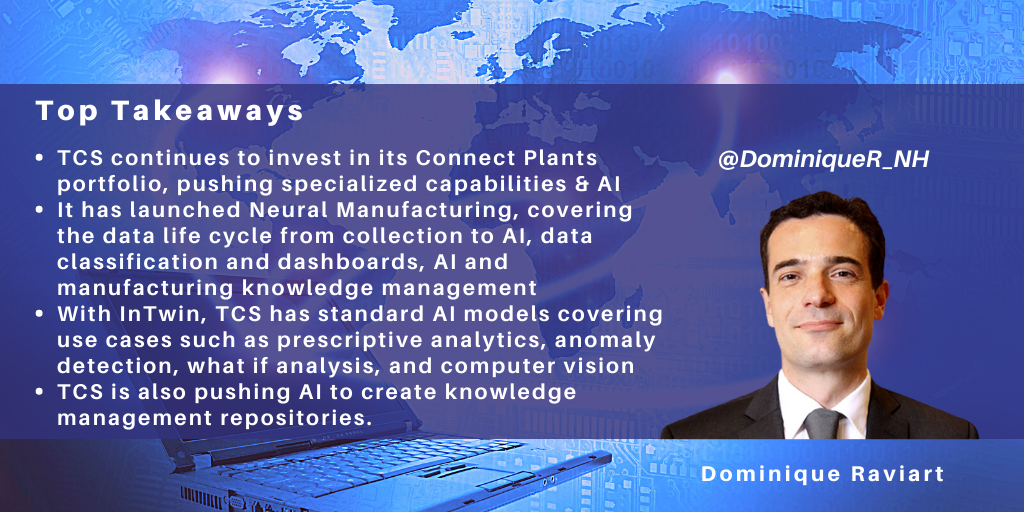posted on Sep 21, 2022 by Dominique Raviart

We recently talked to TCS about the company’s involvement in connected plants, TCS’ terminology for digital manufacturing.
TCS has a broad connected plants portfolio, ranging from manufacturing IT systems, MES, Industry 4.0 and connected supply chain, to industrial control systems, and automation. The development of this portfolio currently emphasizes further specialization and digitalization. The specialization goes deep with, for example, a recent offering focusing on supply chain integration for discrete manufacturing clients that operate under a batch production mode.
Along with increased specialization, digital is a high priority for TCS. Areas of focus here include AI, digital twins, and edge-based automation. It recently launched its Neural Manufacturing initiative to spread AI use cases among manufacturing plants.
Neural Manufacturing covers the data life cycle from data collection and classification, to analytics and AI use cases, and knowledge management. TCS has created three modular solutions covering these areas: DMP, InTwin, and CPOA.
TCS Digital Manufacturing Platform Focuses on Data Classification & Dashboarding
Digital Manufacturing Platform (DMP) collects data from sources such as data historians, sensors and equipment, and RFID tags, connecting with applications such as MES through interfaces or APIs.
However, DMP goes beyond data collection. It also focuses on data classification by creating data models, metadata, ontology, and instances. Classification is primarily manual at this stage, with TCS working on its automation, though DMP can already upload spreadsheet-based asset hierarchies and graph tools. Complementing data classification, DMP has ~50 standard dashboards aligned by use case, and include standard metric and descriptive analytics.
TCS InTwin Digital Twin Platform Has ~120 Standard Algorithms
While DMP provides access to data, InTwin provides digital twin functionality using AI to help users make sense of their manufacturing data. With InTwin, TCS has created ~120 standard AI algorithms around standard use cases such as prescriptive analytics, anomaly detection, what if analysis, and image analytics. TCS helps organizations prepare the data for building and enhancing these AI models, including selecting which data to use or creating synthetic data as necessary.
AI models continue to be a priority for TCS. It highlights that organizations’ demands are expanding from point solutions, e.g., anomaly detection, to more comprehensive digital twin projects such as equipment simulation. The company can recreate the behavior of specific equipment and conduct what-if analyses.
TCS Cognitive Plant Operations Advisor Solution Supports Plant Operatives
Finally, with its Cognitive Plant Operations Advisor (CPOA) solution, TCS is targeting the world of manufacturing knowledge management. While many organizations have engaged in AI pilot activity to derive data from their manufacturing operations, few have engaged in knowledge management beyond document digitization. TCS uses several techniques to create this knowledge. The company uses NLP for semantics, captures knowledge from different data sources such as drawings, and uses methods such as fault tree models for root cause analysis.
Further Specialization and Investment are Underway
TCS continues to enhance its Neural Manufacturing software suite. The company has already moved beyond the development of point use cases and accelerators and has formalized its capabilities into more expansive software products.
And indeed, NelsonHall finds that the use of AI in digital manufacturing is relatively embryonic. AI opens many possibilities around data and a better understanding of the behavior of equipment and plants, bringing new possibilities such as equipment and plant simulation. The number of use cases is fast expanding. We are glad to see TCS is making the necessary investment in this strategic space.
